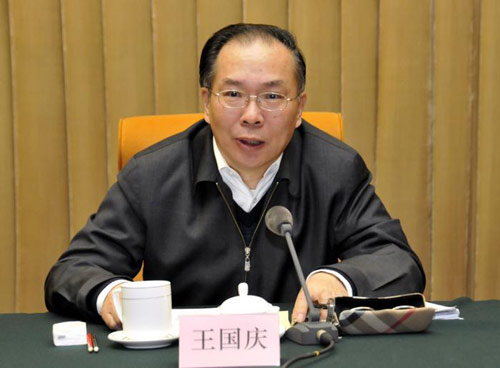當前位置: Language Tips> 雙語新聞
China should add more full-time spokespersons: senior official
分享到

|
China should appoint more full-time spokespersons and promote the professionalization of the sector, as the current system has impaired the country's news release and information transparency efforts, a senior political adviser said. Wang Guoqing, vice-chairman of the Foreign Affairs Committee of the National Committee of the CPPCC, made the remark amid an increasing demand from the public for timely news releases. Premier Li Keqiang made a pledge on Wednesday, in his first Government Work Report delivered to the country's top legislative session, to "improve the spokesperson system and make government operations more open" in a bid to "address the social concerns". According to Wang, who is also a former deputy minister of the State Council Information Office, the country's top information body, the current spokespersons are mostly not professionals, and most of them only take the post as a part-time job alongside their other major duties. "Being a spokesman is not an important part of their career, and they can choose to perform the role or not," Wang said, adding that some prefer not to speak much, either because they lack the ability or fear they will make a mistake that will ruin their career. In addition, some spokespersons are not key members of their workplace, so they lack access to crucial information and the decision-making process, which hampers their ability to deliver sufficient messages to the public and media in a timely way, according to Wang. Observers also said that unlike their Western counterparts, most of whom have been trained in journalism, the majority of Chinese spokespersons started their careers as officials. They usually deliver government policies in a stiff way and tend to defend government actions instead of thinking from a media perspective. China should add more full-time spokespersons: senior official "Meanwhile, the Chinese culture of worshipping the philosophy of the 'unsung hero' and 'speak less and work more' has made active voices rare here," Wang added. The veteran information official proposed making the spokesperson post a new type of professional technical talent, to be incorporated into the current 29 categories of technical professions authorized by the country's human resources authorities. By doing so, there will be a threshold for the profession, along with an entry and exit system with detailed regulations. Candidates should be tested regularly, and various government agencies and relevant corporations should have the post, Wang said. It is also a kind of protection for the spokespersons, Wang said, referring to cases in which spokespersons are sometimes ordered by their leaders to deliver inaccurate messages. China's spokesperson and news release system has flourished since 2003, when the government was criticized for not releasing information in a timely manner on the deadly SARS outbreak. A national uproar then made the top leadership aware of the necessity of timely news release. According to official statistics, over the past 10 years, more than 540 officials have been appointed as spokespersons by the central and provincial-level governments. As a senior official devoted to promoting the country's information transparency, Wang said China's information releasing system has been instrumental in keeping the public well informed and pushing for more government transparency. "It has played a key role in China's politics and deepening the reform and opening up," Wang said. However, as China opens up even more and public expectations for timely information increase, the current system won't be able to meet demand, especially in a digital era, Wang said. "If the government cannot use the information at hand to guide the public, it simply cannot work. Therefore, it's time to push the system forward," Wang said. Wang also stressed that the Party and government leaders at various levels should improve their media awareness, and enhance their ability to deal with the media and the public. Unlike their Western counterparts, most Chinese are not cultivated in a media-sensitive way. As a result, some Chinese officials occasionally make improper comments on hot social issues. "It is time for change, and officials should face the public more often," Wang said. |
《中國日報》3月10日報道:有資深政策建議者表示,現有的新聞發言人制度已經阻礙了中國的新聞發布和信息透明,中國應該推進這一領域的專業化,任命更多全職發言人。 大眾對新聞發布及時性的需求不斷增長,在這一背景下,全國政協外事委員會副主席王國慶提出了上述觀點。 上周三全國人民代表大會開幕,李克強總理在他的第一份政府工作報告中承諾發展新聞發言人制度,讓政府工作更加公開,化解來自社會的擔憂。 王國慶曾任國務院新聞辦公室副部長。據他介紹,在國家最高級別信息發布主體中,現任發言人少有專業人士,他們中多數另有主業,發言人只被他們當做副業。 “當發言人不是他們事業的重要組成部分,他們可以當,也可以不當。”王國慶這樣說。他還補充,要么是因為能力欠缺,要么是因為害怕犯錯影響前途,有的發言人寧愿少開口。 另外,同樣根據王國慶的介紹,有些發言人不是相關單位的重要職員,難以知曉關鍵信息和決策進程。這使得他們無法及時向公眾和媒體給出充足的信息。 也有觀察者指出,中國的多數發言人從官員起步,而在西方,這一崗位的任職者多數接受過新聞業的訓練。 中國的發言人總是枯燥地宣布政府決策,更傾向于維護政府行為,不從媒體的角度思考。 “與此同時,”王國慶還說,“中國文化推崇‘無名英雄’和‘少說話,多做事’的哲學,這使得積極的聲音十分稀少。” 這位經驗豐富的新聞官員提出建議,將發言人作為一種新的專業技術人才,讓發言人融入人力資源和社會保障部已經設定的29種專業技術人才。 由此,這一職業將設定門檻,這一領域的出入將有詳細的規則。希望從事這一職業的人要接受定期考核,諸多政府部門和相關單位將設有發言人這一職位。王國慶這樣描述。 這也是對發言人的保護,王國慶稱,從發生過的事件來看,發言人有時會礙于領導,發布有誤的信息。 中國的新聞發言人和信息發布制度于2003活躍起來。當時,有批評指出政府沒有及時發布致命病毒SARS的疫情。舉國嘩然,這讓最高層領導意識到了信息發布及時的必要性。 根據官方統計,在過去的十年有540名官員被中央和省級政府任命為發言人。 作為致力于推動國家信息透明的高級官員,王國慶說,中國的信息發布制度一直是推進政府透明,讓公眾充分知曉信息的工具。 “這是中國政治的關鍵,起著深化改革開放的作用。”王國慶說。 然而,隨著中國越來越開放,公眾越來越期望及時獲得信息。現有的政策無法滿足要求,尤其是在數字時代,王國慶說。 “不能運用手中的信息引導公眾,政府會無法工作。因此,是時候改進政策了。” 王國慶強調,黨和政府的各級領導都應該提高他們的媒體意識,加強應對媒體和公眾的能力。 不同于西方同行,中國發言人沒有培養出對媒體的敏感。于是,一些中國官員在社會熱點事件上間或拋出不恰當的言論。 王國慶說,“是時候做出改變了,官員應該更頻繁地面對公眾。” (作者:吳嬌 譯者:張憬) |
上一篇 : 緊縮政策產生負面影響 中國“地王”岌岌可危
下一篇 : 馬警方稱冒用護照的伊朗人并非恐怖分子
分享到
關注和訂閱


電話:8610-84883645
傳真:8610-84883500
Email: languagetips@chinadaily.com.cn